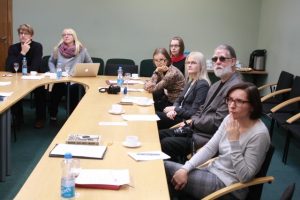Below, you will find the Autumn edition of the Baltic Heritage Network quarterly newsletter. In these pages, you will find information about our past and future events, new publications, and what is happening across the globe within the diaspora research and archive communities.
In this issue:
- Andres Kasekamp Arrives as the Chair of Estonian Studies
- Sharing Our Stories was exhibited in Ottawa
- “We Thought We’d Be Back Soon” Captures Displaced Persons’ Experiences
- Celebrating 10 Years Since the First BaltHerNet Summer School
- Adolfas Damušis Democracy Studies Centre opened at the National Library of Lithuania
- Third printing of Alberta’s Estonian Heritage “Collection”
- Summer Interns
- VEMU Events Spring 2017
- BALTHERNET Conference: New Beginnings of Baltic Diaspora
Please click on the pdf link below to read more:
https://www.balther.net/wp-content/uploads/2015/12/BHN_3_20_2017.pdf
 On 3 November 2015 the Martynas Mažvydas National Library of Lithuania hosted the annual international Baltic Heritage Network diaspora seminar. It was the 22nd event in the last six years and the second to be held in Vilnius. It brought together researchers, librarians and archivists from all three Baltic countries working in the field of diaspora studies. In this international forum, eight papers were presented. Topics for three paper sessions ranged from collecting, exploring and digitizing archival data to making field research of diaspora communities, and analysing exile literature.
On 3 November 2015 the Martynas Mažvydas National Library of Lithuania hosted the annual international Baltic Heritage Network diaspora seminar. It was the 22nd event in the last six years and the second to be held in Vilnius. It brought together researchers, librarians and archivists from all three Baltic countries working in the field of diaspora studies. In this international forum, eight papers were presented. Topics for three paper sessions ranged from collecting, exploring and digitizing archival data to making field research of diaspora communities, and analysing exile literature.